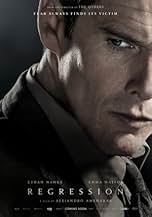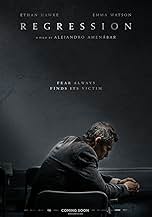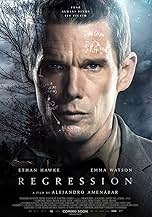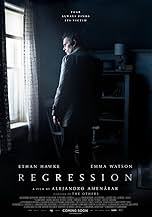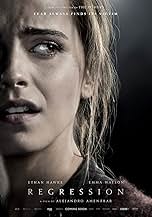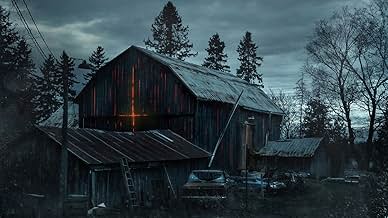IMDb रेटिंग
5.6/10
44 हज़ार
आपकी रेटिंग
अपनी भाषा में प्लॉट जोड़ेंA detective and a psychoanalyst uncover evidence of a satanic cult while investigating a young woman's terrifying past.A detective and a psychoanalyst uncover evidence of a satanic cult while investigating a young woman's terrifying past.A detective and a psychoanalyst uncover evidence of a satanic cult while investigating a young woman's terrifying past.
- पुरस्कार
- 1 जीत और कुल 2 नामांकन
फ़ीचर्ड समीक्षाएं
I knew nothing about the film before I watched it, nor about the events on which it is based. Perhaps because of this I became very confused about the film's point of view.
At base, this film asks the viewer to try to distinguish reality from fantasy during a police inquiry into accusations of satanic abuse. The problem with the fim-maker's style, for me, was that all the resources of cinema were used to illustrate not only the satanic abuse reported by witnesses but also other scenarios that had not been reported, so we saw constant scenes of abusers with spookily made-up faces and monks' cowls, and various horrific depictions of satanic abuse. Because cinema is a naturalistic medium, it was difficult to know what was fantasy and what was reality.
The film in some ways had a classic detective-story structure, with Ethan Hawke as the determined investigator. But it became clear that he was an unreliable first-person character after he began behaving irrationally, and that left me, as a viewer, with nothing to cling to as a source of viewpoint in the film. When it came to scenes in which the detective was absent, it was even more difficult to distinguish what the film-maker was depicting as real and what as fantasy. For example, when the victim's grandmother went out to her shed, she saw a normal cat, which turned into a devil cat. This had nothing to do with the investigation, yet its satanic imagery was of the same type as that provoked by the regression-therapy sessions. Perhaps some point was being made about the phenomenon of group hallucination or delusion, but the film repeatedly neglected its responsibility to give us a touchstone by which we could judge the accuracy of what we were seeing.
I think the film could have addressed the topic better with the excellent actors at its disposal by NOT depicting any of the satanic events. It would have been all the more chilling for that, adding to the tension of the inquiry. The most famous dramatisation of this sort of subject matter was Arthur Miller's "The Crucible". Miller creates nightmarish scenes of communal paranoia but without illustrating any of the events described by the witnesses. And this does not hinder the story's potency. (What could be more horrific than to see Miller's village girls in full accusatory mode, triggering the arrest of various pillars of the community on charges of devil worship?) "Regression", however, lacks the necessary moral distance from the events it depicts. Only in the last minute or two is sanity restored. I left the cinema feeling as if I had been cruelly led about by the nose to no satisfactory purpose.
At base, this film asks the viewer to try to distinguish reality from fantasy during a police inquiry into accusations of satanic abuse. The problem with the fim-maker's style, for me, was that all the resources of cinema were used to illustrate not only the satanic abuse reported by witnesses but also other scenarios that had not been reported, so we saw constant scenes of abusers with spookily made-up faces and monks' cowls, and various horrific depictions of satanic abuse. Because cinema is a naturalistic medium, it was difficult to know what was fantasy and what was reality.
The film in some ways had a classic detective-story structure, with Ethan Hawke as the determined investigator. But it became clear that he was an unreliable first-person character after he began behaving irrationally, and that left me, as a viewer, with nothing to cling to as a source of viewpoint in the film. When it came to scenes in which the detective was absent, it was even more difficult to distinguish what the film-maker was depicting as real and what as fantasy. For example, when the victim's grandmother went out to her shed, she saw a normal cat, which turned into a devil cat. This had nothing to do with the investigation, yet its satanic imagery was of the same type as that provoked by the regression-therapy sessions. Perhaps some point was being made about the phenomenon of group hallucination or delusion, but the film repeatedly neglected its responsibility to give us a touchstone by which we could judge the accuracy of what we were seeing.
I think the film could have addressed the topic better with the excellent actors at its disposal by NOT depicting any of the satanic events. It would have been all the more chilling for that, adding to the tension of the inquiry. The most famous dramatisation of this sort of subject matter was Arthur Miller's "The Crucible". Miller creates nightmarish scenes of communal paranoia but without illustrating any of the events described by the witnesses. And this does not hinder the story's potency. (What could be more horrific than to see Miller's village girls in full accusatory mode, triggering the arrest of various pillars of the community on charges of devil worship?) "Regression", however, lacks the necessary moral distance from the events it depicts. Only in the last minute or two is sanity restored. I left the cinema feeling as if I had been cruelly led about by the nose to no satisfactory purpose.
Mystery/thrillers are always the movies that I enjoy the most. I just like that genre, where you relax and try to figure out what's going on. Sometimes they are bad and sometimes they are good like this one. I didn't see the end coming and that's what I like most about it. Even though I would have preferred another ending, it doesn't matter because it came as a surprise to me and that I enjoy. Especially when it's with good actors like Ethan Hawke and Emma Watson. All the other actors were quality as well. I truly enjoyed the dark passages of Regression. Good job from Alejandro Amenábar. I will certainly watch more of his movies. I can get that some people don't like the movie but to give it a rating under five is just ridiculous. That's my point of view. Certainly when you see the amount of garbage movies that get more points then Regression.
I would have never watched this movie if I had seen the low ratings "stars" this movie received. I am glad that I saw it first. This movie may appeal more to people who grew up in the 1970's and 80's. In that time frame there was a underlying paranoia about satanism helped along by our Mothers and Media.We were told that there were hidden satanic messages in music and other forms of entertainment. There were many movies about satanic worshipers,Cults,anti-Christ and Demons.This movie does a good job of encapsulating that paranoia. I have to say the acting is good and the cinematography is really good. If you like mystery/Thriller movies and lived through the 70's and 80's I think you will like this Movie.The younger generation should also give it a try, you might enjoy it. I Give it 8 at 10 stars.
I don't think this one will take any prizes for acting, or even for its fairly modest special effects, but it has a reasonably intelligent script and enough tension and intrigue to keep the audience awake. It takes its inspiration from a wave of Satanic child abuse accusations and actual court cases that swept the world in the 1980s and 90s, but fizzled out with very little hard evidence emerging and very few convictions. Many blamed 'false memories' implanted by well-meaning counselors and psychologists and even the Press, unintentionally encouraging people in the creation of fantasies. 'Regression' tries to show how, in a manner reminiscent of the Salem witch trials, human suggestibility creates 'evidence' out of thin air, and delusional states become contagious. In doing this it is of course skating on thin ice, since similar ideas have often been used in attempts to discredit the claims of those reporting genuine 'historical' cases of assault or abuse.
The resolution presented in 'Regression' is perhaps one of the least satisfying aspects of the film, and I was surprised that no reference was made to the fundamentalist Christian element for which parts of America are so famous.
I think this one entertains, and after a slowish start builds up to quite a fast and dramatic pace in the second half. I would definitely recommend seeing it, but I don't think you would lose very much by waiting for it to get to rental or television.
The resolution presented in 'Regression' is perhaps one of the least satisfying aspects of the film, and I was surprised that no reference was made to the fundamentalist Christian element for which parts of America are so famous.
I think this one entertains, and after a slowish start builds up to quite a fast and dramatic pace in the second half. I would definitely recommend seeing it, but I don't think you would lose very much by waiting for it to get to rental or television.
If you can trust an actor to make a good horror, lately that one is Ethan Hawke. From Sinister, to The Purge, or Daybreakers, he knows how to pick them and make the most of them.
A lot more psychological than the rest, Regression has a beautiful story, with a great dark atmosphere, suspense, scares, all the ingredients to a good little horror. I was intrigued from start to end, waiting to see more, trying to wrap my brain around it, and expecting a finish that would make the most sense.
And boy I got it all! It really is a great production, an example of what a horror should look like, goes hand in hand with Deliver Us From Evil, both movies are smart and filled with tension.
Cheers!
A lot more psychological than the rest, Regression has a beautiful story, with a great dark atmosphere, suspense, scares, all the ingredients to a good little horror. I was intrigued from start to end, waiting to see more, trying to wrap my brain around it, and expecting a finish that would make the most sense.
And boy I got it all! It really is a great production, an example of what a horror should look like, goes hand in hand with Deliver Us From Evil, both movies are smart and filled with tension.
Cheers!
क्या आपको पता है
- ट्रिविया"Satanic Panic" is the name of the cultural obsession with "Satanic Ritual Abuse" which originated in the United States in the 1980s with the now-discredited memoir-style book "Michelle Remembers," written by Canadians Michelle Smith and her husband, psychiatrist Lawrence Pazder. The authors made waves during the 80's by traveling the talk-show circuit and testifying as expert witnesses in criminal trials alleging Satanic abuse. The book and Smith are represented in the film as "In Satan's Name" by S. Cooper, who is shown as a TV interview subject whose face is obscured in shadow to hide her identity.
- गूफ़The poster of Polish Death/Black Metal Band Behemoth is from 2014 whereas the film is set in 1990.
- भाव
Bruce Kenner: I am starting to use my head again.
- कनेक्शनFeatured in Projector: Macbeth/Regression (2015)
- साउंडट्रैकThat's Where the Blues Begin
Written by Thomm Jutz and Peter Cronin
Music Library & SFX SL / Audio Network Ltd
टॉप पसंद
रेटिंग देने के लिए साइन-इन करें और वैयक्तिकृत सुझावों के लिए वॉचलिस्ट करें
- How long is Regression?Alexa द्वारा संचालित
विवरण
- रिलीज़ की तारीख़
- कंट्री ऑफ़ ओरिजिन
- आधिकारिक साइट
- भाषा
- इस रूप में भी जाना जाता है
- Truy Hồi Ký Ức
- फ़िल्माने की जगहें
- RC Harris Water Treatment Plant, टोरोंटो, ओंटेरियो, कनाडा(prison exteriors)
- उत्पादन कंपनियां
- IMDbPro पर और कंपनी क्रेडिट देखें
बॉक्स ऑफ़िस
- बजट
- $2,00,00,000(अनुमानित)
- US और कनाडा में सकल
- $55,039
- US और कनाडा में पहले सप्ताह में कुल कमाई
- $33,915
- 7 फ़र॰ 2016
- दुनिया भर में सकल
- $1,76,71,101
- चलने की अवधि
- 1 घं 46 मि(106 min)
- रंग
- ध्वनि मिश्रण
- पक्ष अनुपात
- 2.35 : 1
इस पेज में योगदान दें
किसी बदलाव का सुझाव दें या अनुपलब्ध कॉन्टेंट जोड़ें




